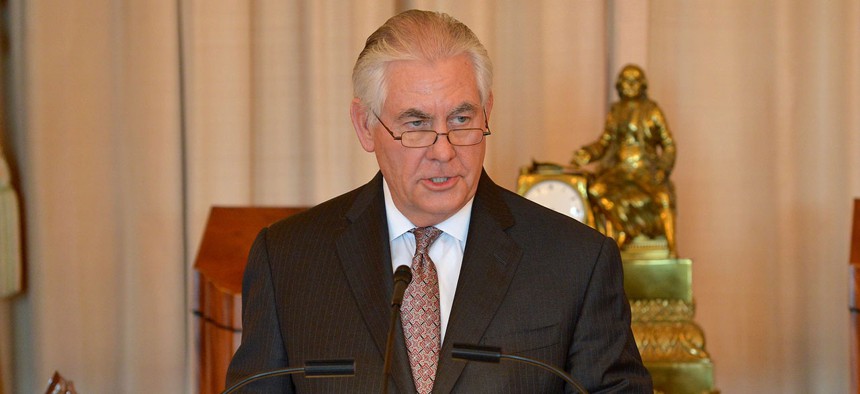
State Department photo
The State Department Has No Time For Many International Institutions
The Trump administration's disregard for international organizations insulting to other countries—and could come back to bite it.
International organizations are having trouble getting on US secretary of state Rex Tillerson’s schedule.
The State Department ditched a hearing of the Inter-American Commission on Human Rights on March 21, citing legal reasons. A day before, the agency said Tillerson would not be attending a North Atlantic Treaty Organization (NATO) summit in April due to prior commitments.
The State Department’s decision to bow out of the international meetings has been described by experts as unprecedented and worrisome. That disregard for international organizations, which is emerging as a key tenet of Trump’s foreign policy, is not only insulting to other countries, but could come back to bite the US itself.
Until Trump, the US was a regular at the Inter-American Commission on Human Rights (IACHR), an international body that monitors human right violations from Canada to Chile. (It’s part of the Organization of American States.) While it doesn’t have the power to force member countries to change their policies, it can shine an international spotlight on human rights abuses that national governments refuse to confront.
IACHR had asked the US to appear at several public hearings during its most recent gathering, held March 15-22 in Washington DC. It wanted the US to address Trump’s executive orders on immigration, including one that seeks to bar citizens from six majority-Muslim countries from traveling to the US.
The US declined, saying that speaking publicly about that order could affect pending court cases against it. A State Department spokesman assured reporters at a press briefing the US has “tremendous respect” for the commission’s role in safeguarding human rights.
But as some critics have pointed out, other US presidents, including George W. Bush and Barack Obama, had dispatched officials to the commission to defend policies contested by lawsuits. There were also other, unrelated items on the IACHR agenda, including hearings on the US’s internment of Latin Americans of Japanese descent during World War II. The US skipped those, too.
IACHR called the no-show troubling. The American Civil Liberties Union (ACLU), one of the parties that spoke out against Trump’s travel ban during the hearings, was harsher. The group’s human rights director, Jamil Dakwar, called the US’s absence “a dangerous precedent that mirrors the behavior of authoritarian regimes and will only serve to embolden them.”
If avoiding IACHR erodes the US’s goodwill reserves among its neighbors in the Americas, it is mostly symbolic loss. Disengaging with NATO could have more serious consequences.
Missing the alliance’s meeting would signal that the US is downgrading its ties with NATO members—in favor, many suspect, of Russia, where Tillerson plans to make a trip in April.
The State Department says Tillerson could end up attending the NATO summit if the dates are changed to fit his schedule. But that signaling of priorities is alone enough to ruffle feathers. The next time the US is in the midst of an international crisis, it might find its traditional European allies less willing to back it up.
NEXT STORY: Please Back Away From the Partisan Brink






